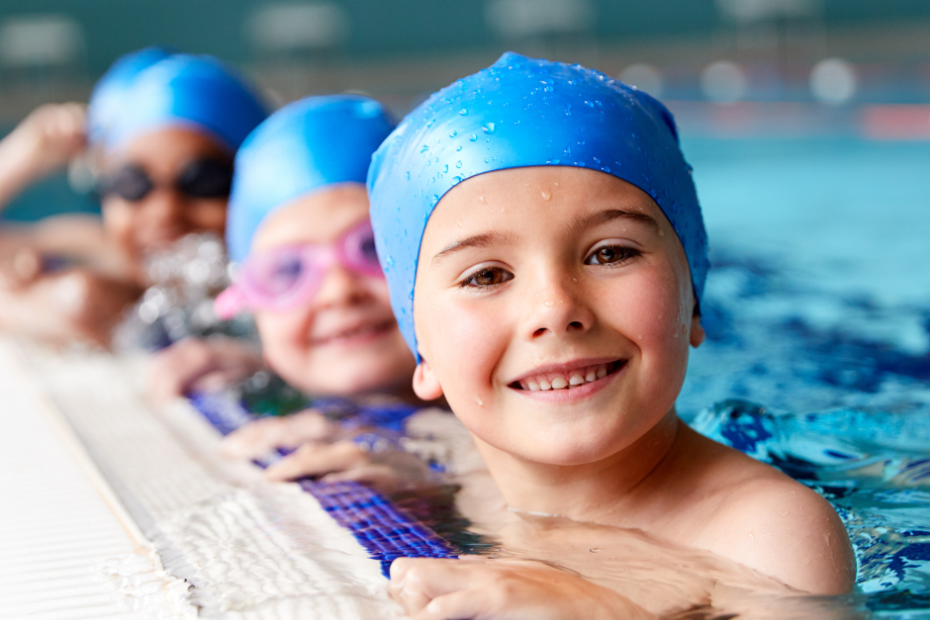When my son began swimming lessons, I was left perplexed.
On land, he had no trouble following instructions and he seemed within the expected range of emotional maturity for his age at the time. He also was a kid who loved water – bathtime, the beach, the pool…he was in with no fear,and had to be dragged out.
So what happened when we suddenly found ourselves at swimming lessons?
Giant emotions, clinging to my leg, refusal to get in the pool, screaming, tears, tears and more tears…both of ours by the end!
Living in Australia, swimming lessons are often a non-negotiable and rite of passage for children. Apart from the water safety aspect, swimming is often considered one of the best full-body exercises for children, enhancing coordination, lung capacity and muscle tone. But for some children, like my son, things derail at swim school and learning to swim can be an unexpectedly difficult and frustrating experience. As we discovered, not due to fear of water or lack of opportunity, but because of something deeper laying beneath the surface – retained primitive reflexes.
Primitive reflexes are automatic movement patterns that originate in the brainstem and develop in the womb or shortly after birth. These reflexes help newborns survive in their early months. However, as the brain matures, these reflexes should naturally integrate — meaning they are inhibited or replaced by more refined, voluntary movements. When this integration doesn’t happen properly, it can result in retained primitive reflexes, which interfere with physical coordination, balance, posture, and sensory processing.
Swimming without primitive reflexes well integrated, is very hard. This can be when the foundations fall apart.
1. Disrupted Body Coordination
Swimming requires coordinated movement between the arms, legs, head, and trunk. It requires either the left and right side of the body to be doing different things at the same time and the upper and lower part of the body to be doing different things at the same time.
Retained reflexes such as the Asymmetrical Tonic Neck Reflex (ATNR) and Symmetrical Tonic Neck Reflex (STNR) interfere with coordinating two parts of the body together.
- ATNR causes the arm and leg on one side of the body to extend when the head turns in that direction. The arm and leg on the other side of the body flex. In the pool, this change in muscle tone results in opposite patterns on each side of the body whenever the head turns which can lead to difficulties with alternating arm strokes, kicking evenly, keeping a straight path or over-rotating the body.
- STNR affects the relationship between the head and limbs. When the child lifts their head, the arms may extend and legs bend; when the head drops, arms bend and legs extend — the opposite of what’s needed for smooth, coordinated swimming.
Children with retained reflexes often move stiffly or awkwardly in water, expend more energy, and struggle with stroke rhythm, making it harder to keep afloat or make progress during lessons.
2. Poor Postural Control and Core Stability
Strong core muscles are essential for floating, maintaining body position, and performing continuous swimming strokes. Primitive reflexes like the Tonic Labyrinthine Reflex (TLR) and Moro Reflex can negatively affect muscle tone and postural control.
- TLR, when retained, can lead to difficulties with head control, balance, and body orientation — vital components for swimming.
- A retained Moro Reflex (the startle reflex) causes exaggerated reactions to sudden changes, including movement or sound. In a noisy, echoing pool or during unexpected splashes, a child with a retained Moro Reflex might feel overwhelmed or even panic, making it hard to relax and float.
These challenges with stability and posture mean that children may have trouble maintaining the proper body position in the water and have particular difficulty doing a back float which can feel unsafe or disorienting.
3. Sensory Processing Issues
Swimming is a sensory-rich activity — water pressure, temperature, sound echoes, movement in multiple directions, and interactions with others can all be overwhelming. Children with retained primitive reflexes often have underdeveloped sensory integration, which means their brain has trouble processing and responding appropriately to sensory input.
For example:
- Children may be hypersensitive to water on their face, ears, or head.
- They might panic when water enters their nose or mouth.
- Sudden movement in water can trigger fight-or-flight responses due to a retained Moro Reflex.
All these reactions can make swimming feel unsafe or distressing, leading to resistance, fear, or even withdrawal during lessons.
5. What Can Help
Understanding that retained primitive reflexes may be the root cause of swimming difficulties is the first step. If swimming lessons are becoming a chore and leave everyone wobbly, then maybe give them a break for a while. Practice will not make perfect if there are retained primitive reflexes and the resistance to swimming will build.
Save the money, and spend the time working to integrate your child’s primitive reflexes to help them have success in the pool. When they begin lessons again, you’ll see the improvement.
So sink or swim?
Swimming is a complex, multi-sensory, full-body task that challenges coordination, core strength, and emotional regulation. For children with retained primitive reflexes, it can feel like trying to swim against the current — their bodies move reflexively, rather than intentionally, making learning to swim slow, stressful, and sometimes scary.
As for my son, after reflex work when he was younger, he’s now a patrolling surf life saver, competes in surf lifesaving competitions and is a squad swimmer. In fact, swimming is now his sport of choice!
With the right foundations in place, your child can find their difficulty with swimming significantly reduced. And as for you, you’ll find your time soaking up that chlorine on the sidelines, just that little bit more enjoyable with them smiling.
